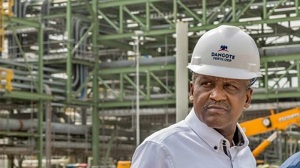-By Divine-Favour Efemena
Subsidy removal has been an issue of debate among successive governments in Nigeria as operators in the oil industry have often advised the government over its removal to pave the way forward for the country’s downstream sector to thrive.
The government had always been showing tepid response in defence of the poor which it believed cannot afford increase in fuel price if left in the hands of operators to drive the market. But current realities caused by global pandemic with crash in oil price coupled with alternative to crude have propelled the action of the government to put a stop to prolonged fuel subsidy project gulped millions of naira over four decades.
The decision will save President Muhammadu Buhari’s government at least $2 billion a year, at a time when Africa’s biggest crude producer needs funds to deal with the coronavirus pandemic. It’s also a politically fraught move — a rebound in oil prices could rouse the opposition and test the regime’s resilience. Previous attempts to wean Nigerians off cheap fuel have led to major anti-government protests.
According to a senior analyst at Lagos-based business advisory firm, SBM Intelligence, Cheta Nwanze, “Given the relationship Nigerians have with cheap fuel, rising oil prices will have a significant political cost.” Buhari could use “security services to put down protests that are likely to erupt.”
For a country that is used to cheaper fuel consumption, it might be difficult to carry out any policy that is considered inimical to the people who are ready to protest against such action.
The abolition of the subsidy means Nigerians will now pay between 123 naira ($0.32) and 125 naira a liter for fuel, the lowest price in a decade, according to the Nigerian National Petroleum Corporation (NNPC).
The NNPC Group Managing Director (GMD), was of the view that how much people pay in future will be determined by market forces.
In six decades of pumping crude, Nigeria has produced some of the continent’s best-known billionaires, while at same time creating a deeply unequal society in which almost half the population lives in extreme poverty. For a vast majority of its 200 million people, cheaper fuel is the only benefit they see from a state that built no social-safety net for its citizens during the oil boom.
In 2012, President Goodluck Jonathan endevoured to scrap subsidy and fuel prices surged, he faced two weeks of protests and riots before demurring and reversing the decision. The political damage Jonathan suffered as a result contributed to his defeat in elections in 2015.
Yet Buhari has few options. With government revenue projections decimated because of the pandemic, not only will the measure save money, it will also provide funds that are urgently needed for capital investments to aid the diversification of the economy.
Lagos-based analysts, Tajudeen Ibrahim and Ebovi Wali added that “recent reform must be institutionalized. This will ensure that the subsidy regime is abolished by a legislative act, and may require rigorous legislative procedure to repeal.”
Since the start of the year, Brent crude, which compares with Nigeria’s export grades, has slumped 36%, battered by a lack of demand due to the pandemic and a ruinous price war between Saudi Arabia and Russia. Nigeria, which has relied on crude exports for two-thirds of government revenue and more than 90% of export receipts in the past decade, is staring recession in the face for the second time in four years.
The government would have had more room to maneuver if the country produced its own fuel. But four state-owned refineries built between the 1960s and 1980s to process 445,000 barrels of crude daily have fallen into disrepair, barely functioning at a fraction of their capacity.
The Dangote Perspective as a Succour
Much of the country’s hopes for achieving self-sufficiency in fuel refining are now pinned on the 650,000-barrel-per-day Dangote Petroleum Refinery that is scheduled to come on stream in the second half of 2021. Owned by Africa’s richest man, Aliko Dangote, it will produce enough to meet Nigeria’s daily consumption of about 300,000 barrels of oil and have extra for export.
It will also mean the government will not have to import refined fuel, saving shipping and landing costs that will help lower the cost of fuel.
Whether the government reverses the scrapping of the subsidy will largely be determined by the severity of the fiscal crisis it’s facing.
The International Monetary Fund has approved $3.4 billion in emergency funding to Nigeria, the single biggest tranche disbursed for any country so far to fight Covid-19.
This means that if the government subsequently had to sign on to a full-fledged IMF program, that would probably seal the end of the subsidy regime and pave way for improvement in the country’s dwindling economy.


Comment here